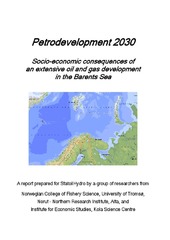Blar i forfatter "Arbo, Peter"
-
Commentary 3 to the manifesto for the marine social sciences: unfolding Blue Growth
Knol-Kauffman, Maaike; Arbo, Peter (Journal article; Tidsskriftartikkel; Peer reviewed, 2020-07-03)A marine social science manifesto is inherently an anticipatory exercise; it looks forward to the ocean and coastal challenges that societies are facing, with which marine social scientists are responsible to engage. The concept of Blue Growth that is mentioned in the manifesto (MMSS 1.1.3) and the related Blue Economy concept are also inherently anticipatory; they deal with a desired future for ... -
Government-industry dynamics in the development of offshore waste management in Norway: from prescriptive to risk-based regulation
Knol-Kauffman, Maaike; Solås, Ann-Magnhild; Arbo, Peter (Journal article; Tidsskriftartikkel; Peer reviewed, 2020-08-14)Petroleum activities are associated with high risks. In the 1980s, concerns arose about the environmental impacts of ‘normal’ petroleum activity. Regular operations go hand-in-hand with emissions to air and discharges to sea. Both have been subject to extensive regulation since the 1990s. This paper analyzes the design and implementation of the Norwegian system that regulates operational discharges ... -
Informasjon og sikkerhet i arktiske farvann
Knol-Kauffman, Maaike; Arbo, Peter (Journal article; Tidsskriftartikkel; Peer reviewed, 2020-06-02)Regjeringens nye nordområdemelding, som blir lagt fram til høsten, kommer like før FN går inn i sitt «havforskningstiår» (2021-2030). Selv om nordområdene handler om mer enn hav, er forvaltningen av de store havområdene nord for polarsirkelen et sentralt element. Arktis har i de seinere årene blitt et brennpunkt for kryssende strategier, interesser og verdier. Den globale oppvarmingen gjør at stadig ... -
Livslang læring - fra slagord til reform
Arbo, Peter (Journal article; Tidsskriftartikkel; Peer reviewed, 2022-06-15)Livslang læring er det nye mantraet. Det dukket opp som et slagord for utdanningsreform på 1970-tallet og er i dag noe som alle tilsynelatende er enige om. Men livslang læring har ulike betydninger og begrunnelser. Veien fra slagord til reform har også vært lang. Denne artikkelen gir et tilbakeblikk på den sammensatte bruken av begrepet og oppsummerer de viktigste reformene som har vært gjennomført ... -
Making the Arctic predictable: The changing information infrastructure of Arctic weather and sea ice services
Knol, Maaike; Arbo, Peter; Duske, Paula; Gerland, Sebastian; Lamers, Machiel; Pavlova, Olga; Sivle, Anders Doksæter; Tronstad, Stein (Journal article; Tidsskriftartikkel; Peer reviewed, 2018-09-19)This paper explores the changing infrastructure around weather and sea ice information provisioning for Arctic marine areas. Traditionally, the most important providers of operational information on sea ice and weather conditions are the national sea ice and meteorological services. More recently, the community of Arctic information providers has become more heterogeneous with the establishment of ... -
Petrodevelopment 2030: Socio-economic consequences of an extensive oil and gas development in the Barents Sea
Didyk, Vladimir; Arbo, Peter; Nilssen, Inge Berg; Hersoug, Bjørn; Nygaard, Vigdis; Sand, Jan Yngve; Østbye, Stein; Riabova, Larissa (Research report; Forskningsrapport, 2007-10)The theme of this report is the regional socio-economic consequences of an extensive oil and gas development in the Barents Sea. The regional focus area includes Finnmark County and Murmansk Oblast. The introductory chapter explains the purpose of the study and the way the work has been done. The next two chapters provide a detailed account of the region and its basic characteristics. The general ... -
Sustainability conflicts in the blue economy: planning for offshore aquaculture and offshore wind energy development in Norway
Knol-Kauffman, Maaike; Nielsen, Kåre Nolde; Sander, Gunnar; Arbo, Peter (Journal article; Tidsskriftartikkel; Peer reviewed, 2023-10-11)Blue economy developments entail an industrialization of the world’s ocean and coastal areas, placing growing pressures on the marine environment and ecosystems. Moreover, the competition for ocean space and resources increases the likelihood for social conflicts. Marine spatial planning has been presented as a tool that can avoid or mitigate conflicts. However, there is a need for a more thorough ... -
The transformation of the oceans and the future of marine social science
Arbo, Peter; Knol, Maaike; Linke, Sebastian; St. Martin, Kevin John (Journal article; Tidsskriftartikkel; Peer reviewed, 2018-04-13)The oceans have become a juncture of great visions of blue growth as well as strong environmental concern. This paper discusses the essential role of the social sciences as the oceans increasingly emerge as a contested social arena. The marine social sciences have generated a vast knowledge about the development of fisheries and the implications of fisheries policies on coastal communities. We review ... -
Use conflicts in ecosystem-based management - The case of oil versus fisheries
Arbo, Peter; Pham, Thi Thanh Thuy (Journal article; Tidsskriftartikkel; Peer reviewed, 2016-01-30)Coastal states around the world are currently adopting an integrated and ecosystem-based approach to the management of coastal and ocean areas. The main aim is to promote resource use while protecting the integrity of the marine ecosystems. Focus is therefore on the conflict between economic development and conservation. Less attention is paid to the complex uses of the ocean and the conditions for ...


 English
English norsk
norsk







